Apologies for the pause, holidays are increasingly busy.
Happy new year! I hope that everyone had a relaxed and healthy Christmas. It was wonderful to have a Christmas where I saw all my siblings and sat down to a large gathering for food. I just hope that the price we pay for relaxing the rules is not too high.
There are many new things in the pipeline.
We are close to unveiling our members areas. One will be for those who are listed on the website as one of our wildlife destinations – there are many positives to sharing your vicinity with wildlife but there are also plenty of problems. The other will be for those who regularly visit the site and are keen to support our work.
The other will be for readers such as yourself. This area will cost a small amount to join (£5 per month at the lowest level) and will allow you to interact with other members, bring wild news of interest to you to the attention of the website, and join us in our quest to save the natural world – there will be a way for you to submit wilderness destinations (obviously this will be helpful to the site, but you will also be recognized for this and I hope that you will be keen to join our effort.
We are also close to adding the ability for people to build their own page to list wild places. The aim is for this process to be incredibly simple, however as you can imagine, if this site is to reach its potential I cannot write all the pages. My hope is that as we leave the strange world of COVID, people will start to find this and add destinations across the world.
On a personal note, my family will be travelling to South Africa this summer (so long as COVID does not cancel plans) to visit the Kruger for 2 weeks. There are a variety of reasons for this trip. Firstly, we intended to visit regularly but due to life, have not been there for 15 years. Secondly, we are keen to show our children the place. Thirdly, we want to add all the public rests stops to our site and need to visit to be able to do this. Fourthly, we are keen to test the live sightings board that we created and is listed on this site – check that it is working and make sure that it does prove useful, and finally fifthly, I am hoping to go on one of the wilderness trails. We hope to return with many wonderful stories to write up and videos to add to our youtube channel.
I am hoping that our tickets have not been booked too early – they are fully refundable or delayable if COVID makes travel impossible this year. However, I hope that I am not the only one who is keen to start travelling again. If you are looking at doing some wild travel this year, do consider some of our locations. While many of them are quite pricey they can all be combined with some self driving safari, which brings down the price dramatically.
Anyway, do keep reading our news, I hope that it is of interest, and have a great year
Tim Welby





